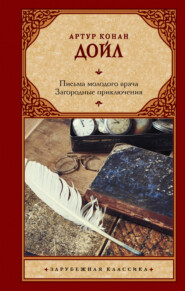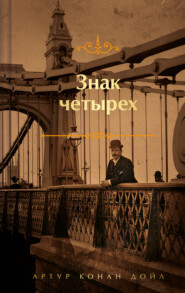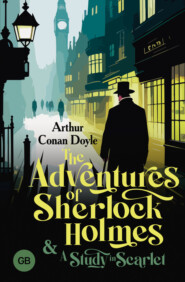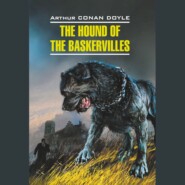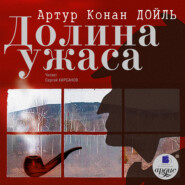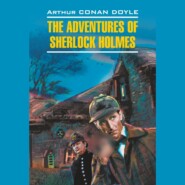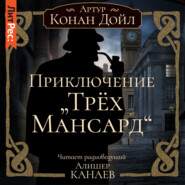По всем вопросам обращайтесь на: info@litportal.ru
(©) 2003-2024.
✖
Micah Clarke
Настройки чтения
Размер шрифта
Высота строк
Поля
As the Blues retired we observed that a single officer brought up the rear, riding very slowly, as though it went much against his mood to turn his back even to an army. The space betwixt the troop and him was steadily growing greater, yet he made no effort to quicken his pace, but jogged quietly on, looking back from time to time to see if he were followed. The same thought sprang into my comrade’s mind and my own at the same instant, and we read it in each other’s faces.
‘This path,’ cried he eagerly. ‘It brings us out beyond the grove, and is in the hollow all the way.’
‘Lead the horses until we get on better ground,’ I answered. ‘We may just cut him off if we are lucky.’
There was no time for another word, for we hurried off down the uneven track, sliding and slipping on the rain-soaked turf. Springing into our saddles we dashed down the gorge, through the grove, and so out on to the road in time to see the troop disappear in the distance, and to meet the solitary officer face to face.
He was a sun-burned, high-featured man, with black mustachios, mounted on a great raw-boned chestnut charger. As we broke out on to the road he pulled up to have a good look at us. Then, having fully made up his mind as to our hostile intent, he drew his sword, plucked a pistol out of his holster with his left hand, and gripping the bridle between his teeth, dug his spurs into his horse’s flanks and charged down upon us at the top of his speed. As we dashed at him, Reuben on his bridle arm and I on the other, he cut fiercely at me, and at the same moment fired at my companion. The ball grazed Reuben’s cheek, leaving a red weal behind it like a lash from a whip, and blackening his face with the powder. His cut, however, fell short, and throwing my arm round his waist as the two horses dashed past each other, I plucked him from the saddle and drew him face upwards across my saddlebow. Brave Covenant lumbered on with his double burden, and before the Guards had learned that they had lost their officer, we had brought him safe, in spite of his struggles and writhings, to within sight of Monmouth’s camp.
‘A narrow shave, friend,’ quoth Reuben, with his hand to his cheek. ‘He hath tattooed my face with powder until I shall be taken for Solomon Sprent’s younger brother.’
‘Thank God that you are unhurt,’ said I. ‘See, our horse are advancing along the upper road. Lord Grey himself rides at their head. We had best take our prisoner into camp, since we can do nought here.’
‘For Christ’s sake, either slay me or set me down!’ he cried. ‘I cannot bear to be carried in this plight, like a half-weaned infant, through your campful of grinning yokels.’
‘I would not make sport of a brave man,’ I answered. ‘If you will give your word to stay with us, you shall walk between us.’
‘Willingly,’ said he, scrambling down and arranging his ruffled attire. ‘By my faith, sirs, ye have taught me a lesson not to think too meanly of mine enemies. I should have ridden with my troop had I thought that there was a chance of falling in with outposts or videttes.’
‘We were upon the hill before we cut you off,’ quoth Reuben. ‘Had that pistol ball been a thought straighter, it is I that should have been truly the cut-off one. Zounds, Micah! I was grumbling even now that I had fallen away, but had my cheek been as round as of old the slug had been through it.’
‘Where have I seen you before?’ asked our captive, bending his dark eyes upon me. ‘Aye, I have it! It was in the inn at Salisbury, where my light-headed comrade Horsford did draw upon an old soldier who was riding with you. Mine own name is Ogilvy – Major Ogilvy of the Horse Guards Blue. I was right glad that ye did come off safely from the hounds. Some word had come of your errand after your departure, so this same Horsford with the Mayor and one or two other Tantivies, whose zeal methinks outran their humanity, slipped the dogs upon your trail.’
‘I remember you well,’ I answered. ‘You will find Colonel Decimus Saxon, my former companion, in the camp. No doubt you will be shortly exchanged for some prisoner of ours.’
‘Much more likely to have my throat cut,’ said he, with a smile. ‘I fear that Feversham in his present temper will scarce pause to make prisoners, and Monmouth may be tempted to pay him back in his own coin. Yet it is the fortune of war, and I should pay for my want of all soldierly caution. Truth to tell, my mind was far from battles and ruses at the moment, for it had wandered away to aqua-regia and its action upon the metals, until your appearance brought me back to soldiership.’
‘The horse are out of sight,’ said Reuben, looking backwards, ‘ours as well as theirs. Yet I see a clump of men over yonder at the other side of the Avon, and there on the hillside can you not see the gleam of steel?’
‘There are foot there,’ I answered, puckering my eyes. ‘It seems to me that I can discern four or five regiments and as many colours of horse. King Monmouth should know of this with all speed.’
‘He does know of it,’ said Reuben. ‘Yonder he stands under the trees with his council about him. See, one of them rides this way!’
A trooper had indeed detached himself from the group and galloped towards us. ‘If you are Captain Clarke, sir,’ he said, with a salute, ‘the King orders you to join his council.’
‘Then I leave the Major in your keeping, Reuben,’ I cried. ‘See that he hath what our means allow.’ So saying I spurred my horse, and soon joined the group who were gathered round the King. There were Grey, Wade, Buyse, Ferguson, Saxon, Hollis, and a score more, all looking very grave, and peering down the valley with their glasses. Monmouth himself had dismounted, and was leaning against the trunk of a tree, with his arms folded upon his breast, and a look of white despair upon his face. Behind the tree a lackey paced up and down leading his glossy black charger, who pranced and tossed his lordly mane, a very king among horses.
‘You see, friends,’ said Monmouth, turning lack-lustre eyes from one leader to another, ‘Providence would seem to be against us. Some new mishap is ever at our heels.’
‘Not Providence, your Majesty, but our own negligence,’ cried Saxon boldly. ‘Had we advanced on Bristol last night, we might have been on the right side of the ramparts by now.’
‘But we had no thought that the enemy’s foot was so near!’ exclaimed Wade.
‘I told ye what would come of it, and so did Oberst Buyse and the worthy Mayor of Taunton,’ Saxon answered. ‘However, there is nought to be gained by mourning over a broken pipkin. We must e’en piece it together as best we may.’
‘Let us advance on Bristol, and put oor trust in the Highest,’ quoth Ferguson. ‘If it be His mighty will that we should tak’ it, then shall we enter into it, yea, though drakes and sakers lay as thick as cobblestanes in the streets.’
‘Aye! aye! On to Bristol! God with us!’ cried several of the Puritans excitedly.
‘But it is madness – dummheit – utter foolishness,’ Buyse broke in hotly. ‘You have the chance and you will not take it. Now the chance is gone and you are all eager to go. Here is an army of, as near as I can judge, five thousand men on the right side of the river. We are on the wrong side, and yet you talk of crossing and making a beleaguering of Bristol without breaching-pieces or spades, and with this force in our rear. Will the town make terms when they can see from their ramparts the van of the army which comes to help them? Or does it assist us in fighting the army to have a strong town beside us, from which horse and foot can make an outfall upon our flank? I say again that it is madness.’
What the German soldier said was so clearly the truth that even the fanatics were silenced. Away in the east the long shimmering lines of steel, and the patches of scarlet upon the green hillside, were arguments which the most thoughtless could not overlook.
‘What would you advise, then?’ asked Monmouth moodily, tapping his jewelled riding-whip against his high boots.
‘To cross the river and come to hand-grips with them ere they can get help from the town,’ the burly German answered bluntly. ‘I cannot understand what we are here for if it be not to fight. If we win, the town must fall. If we lose, We have had a bold stroke for it, and can do no more.’
‘Is that your opinion, too, Colonel Saxon?’ the King asked.
‘Assuredly, your Majesty, if we can fight to advantage. We can scarce do that, however, by crossing the river on a single narrow bridge in the face of such a force. I should advise that we destroy this Keynsham Bridge, and march down this southern bank in the hope of forcing a fight in a position which we may choose.’
‘We have not yet summoned Bath,’ said Wade. ‘Let us do as Colonel Saxon proposes, and let us in the meantime march in that direction and send a trumpet to the governor.’
‘There is yet another plan,’ quoth Sir Stephen Timewell, ‘which is to hasten to Gloucester, to cross the Severn there, and so march through Worcestershire into Shropshire and Cheshire. Your Majesty has many friends in those parts.’
Monmouth paced up and down with his hand to his forehead like one distrait. ‘What am I to do,’ he cried at last, ‘in the midst of all this conflicting advice, when I know that not only my own success, but the lives of these poor faithful peasants and craftsmen depend upon my resolution?’
‘With all humbleness, your Majesty,’ said Lord Grey, who had just returned with the horse, ‘I should suggest, since there are only a few troops of their cavalry on this side of the Avon, that we blow up the bridge and move onwards to Bath, whence we can pass into Wiltshire, which we know to be friendly.’
‘So be it!’ cried the King, with the reckless air of one who accepts a plan, not because it is the best, but because he feels that all are equally hopeless. ‘What think you, gentlemen?’ he added, with a bitter smile. ‘I have heard news from London this morning, that my uncle has clapped two hundred merchants and others who are suspected of being true to their creed into the Tower and the Fleet. He will have one half of the nation mounting guard over the other half ere long.’
‘Or the whole, your Majesty, mounting guard over him,’ suggested Wade. ‘He may himself see the Traitor’s Gate some of these mornings.’
‘Ha, ha! Think ye so? think ye so!’ cried Monmouth, rubbing his hands and brightening into a smile. ‘Well, mayhap you have nicked the truth. Who knows? Henry’s cause seemed a losing one until Bosworth Field settled the contention. To your charges, gentlemen. We shall march in half-an-hour. Colonel Saxon and you, Sir Stephen, shall cover the rear and guard the baggage – a service of honour with this fringe of horse upon our skirts.’
The council broke up forthwith, every man riding off to his own regiment. The whole camp was in a stir, bugles blowing and drums rattling, until in a very short time the army was drawn up in order, and the forlorn of cavalry had already started along the road which leads to Bath. Five hundred horse with the Devonshire militiamen were in the van. After them in order came the sailor regiment, the North Somerset men, the first Taunton regiment of burghers, the Mendip and Bagworthy miners, the lace and wool-workers of Honiton, Wellington, and Ottery St. Mary; the woodmen, the graziers, the marsh-men, and the men from the Quantock district. Behind were the guns and the baggage, with our own brigade and four colours of horse as a rearguard. On our march we could see the red coats of Feversham keeping pace with us upon the other side of the Avon. A large body of his horse and dragoons had forded the stream and hovered upon our skirts, but Saxon and Sir Stephen covered the baggage so skilfully, and faced round so fiercely with such a snarl of musketry whenever they came too nigh, that they never ventured to charge home.
Chapter XXVIII. Of the Fight in Wells Cathedral
I am fairly tied to the chariot-wheels of history now, my dear children, and must follow on with name and place and date, whether my tale suffer by it or no. With such a drama as this afoot it were impertinent to speak of myself, save in so far as I saw or heard what may make these old scenes more vivid to you. It is no pleasant matter for me to dwell upon, yet, convinced as I am that there is no such thing as chance either in the great or the little things of this world, I am very sure that the sacrifices of these brave men were not thrown away, and that their strivings were not as profitless as might at first sight appear. If the perfidious race of Stuart is not now seated upon the throne, and if religion in England is still a thing of free growth, we may, to my thinking, thank these Somerset yokels for it, who first showed how small a thing would shake the throne of an unpopular monarch. Monmouth’s army was but the vanguard of that which marched throe years later into London, when James and his cruel ministers were flying as outcasts over the face of the earth.
On the night of June 27, or rather early in the morning of June 28, we reached the town of Frome, very wet and miserable, for the rain had come on again, and all the roads were quagmires. From this next day we pushed on once more to Wells, where we spent the night and the whole of the next day, to give the men time to get their clothes dry, and to recover themselves after their privations.
In the forenoon a parade of our Wiltshire regiment was held in the Cathedral Close, when Monmouth praised it, as it well deserved, for the soldierly progress made in so short a time.
As we returned to our quarters after dismissing our men we came upon a great throng of the rough Bagworthy and Oare miners, who were assembled in the open space in front of the Cathedral, listening to one of their own number, who was addressing them from a cart. The wild and frenzied gestures of the man showed us that he was one of those extreme sectaries whose religion runs perilously near to madness. The hums and groans which rose from the crowd proved, however, that his fiery words were well suited to his hearers, so we halted on the verge of the multitude and hearkened to his address. A red-bearded, fierce-faced man he was, with tangled shaggy hair tumbling over his gleaming eyes, and a hoarse voice which resounded over the whole square.
‘What shall we not do for the Lord?’ he cried; ‘what shall we not do for the Holy of Holies? Why is it that His hand is heavy upon us? Why is it that we have not freed this land, even as Judith freed Bethulia? Behold, we have looked for peace but no good came, and for a time of health, and behold trouble! Why is this, I say? Truly, brothers, it is because we have slighted the Lord, because we have not been wholehearted towards Him. Lo! we have praised Him with our breath, but in our deeds we have been cold towards Him. Ye know well that Prelacy is an accursed thing – a hissing and an abomination in the eyes of the Almighty! Yet what have we, His servants, wrought for Him in this matter? Have we not seen Prelatist churches, churches of form and of show, where the creature is confounded with the Creator – have we not seen them, I say, and have we not forborne to sweep them away, and so lent our sanction to them? There is the sin of a lukewarm and back-sliding generation! There is the cause why the Lord should look coldly upon His people! Lo! at Shepton and at Frome we have left such churches behind us. At Glastonbury, too, we have spared those wicked walls which were reared by idolatrous hands of old. Woe unto ye, if, after having put your hands to God’s plough, ye turn back from the work! See there!’ he howled, facing round to the beautiful Cathedral, ‘what means this great heap of stones? Is it not an altar of Baal? Is it not built for man-worship rather than God-worship? Is it not there that the man Ken, tricked out in his foolish rochet and baubles, may preach his soulless and lying doctrines, which are but the old dish of Popery served up under a new cover? And shall we suffer this thing? Shall we, the chosen children of the Great One, allow this plague-spot to remain? Can we expect the Almighty to help us when we will not stretch out a hand to help Him? We have left the other temples of Prelacy behind us. Shall we leave this one, too, my brothers?’
‘No, no!’ yelled the crowd, tossing and swaying.
‘Shall we pluck it down, then, until no one stone is left upon another?’
‘Yes, yes!’ they shouted.
‘Now, at once?’
‘Yes, yes!’
‘This path,’ cried he eagerly. ‘It brings us out beyond the grove, and is in the hollow all the way.’
‘Lead the horses until we get on better ground,’ I answered. ‘We may just cut him off if we are lucky.’
There was no time for another word, for we hurried off down the uneven track, sliding and slipping on the rain-soaked turf. Springing into our saddles we dashed down the gorge, through the grove, and so out on to the road in time to see the troop disappear in the distance, and to meet the solitary officer face to face.
He was a sun-burned, high-featured man, with black mustachios, mounted on a great raw-boned chestnut charger. As we broke out on to the road he pulled up to have a good look at us. Then, having fully made up his mind as to our hostile intent, he drew his sword, plucked a pistol out of his holster with his left hand, and gripping the bridle between his teeth, dug his spurs into his horse’s flanks and charged down upon us at the top of his speed. As we dashed at him, Reuben on his bridle arm and I on the other, he cut fiercely at me, and at the same moment fired at my companion. The ball grazed Reuben’s cheek, leaving a red weal behind it like a lash from a whip, and blackening his face with the powder. His cut, however, fell short, and throwing my arm round his waist as the two horses dashed past each other, I plucked him from the saddle and drew him face upwards across my saddlebow. Brave Covenant lumbered on with his double burden, and before the Guards had learned that they had lost their officer, we had brought him safe, in spite of his struggles and writhings, to within sight of Monmouth’s camp.
‘A narrow shave, friend,’ quoth Reuben, with his hand to his cheek. ‘He hath tattooed my face with powder until I shall be taken for Solomon Sprent’s younger brother.’
‘Thank God that you are unhurt,’ said I. ‘See, our horse are advancing along the upper road. Lord Grey himself rides at their head. We had best take our prisoner into camp, since we can do nought here.’
‘For Christ’s sake, either slay me or set me down!’ he cried. ‘I cannot bear to be carried in this plight, like a half-weaned infant, through your campful of grinning yokels.’
‘I would not make sport of a brave man,’ I answered. ‘If you will give your word to stay with us, you shall walk between us.’
‘Willingly,’ said he, scrambling down and arranging his ruffled attire. ‘By my faith, sirs, ye have taught me a lesson not to think too meanly of mine enemies. I should have ridden with my troop had I thought that there was a chance of falling in with outposts or videttes.’
‘We were upon the hill before we cut you off,’ quoth Reuben. ‘Had that pistol ball been a thought straighter, it is I that should have been truly the cut-off one. Zounds, Micah! I was grumbling even now that I had fallen away, but had my cheek been as round as of old the slug had been through it.’
‘Where have I seen you before?’ asked our captive, bending his dark eyes upon me. ‘Aye, I have it! It was in the inn at Salisbury, where my light-headed comrade Horsford did draw upon an old soldier who was riding with you. Mine own name is Ogilvy – Major Ogilvy of the Horse Guards Blue. I was right glad that ye did come off safely from the hounds. Some word had come of your errand after your departure, so this same Horsford with the Mayor and one or two other Tantivies, whose zeal methinks outran their humanity, slipped the dogs upon your trail.’
‘I remember you well,’ I answered. ‘You will find Colonel Decimus Saxon, my former companion, in the camp. No doubt you will be shortly exchanged for some prisoner of ours.’
‘Much more likely to have my throat cut,’ said he, with a smile. ‘I fear that Feversham in his present temper will scarce pause to make prisoners, and Monmouth may be tempted to pay him back in his own coin. Yet it is the fortune of war, and I should pay for my want of all soldierly caution. Truth to tell, my mind was far from battles and ruses at the moment, for it had wandered away to aqua-regia and its action upon the metals, until your appearance brought me back to soldiership.’
‘The horse are out of sight,’ said Reuben, looking backwards, ‘ours as well as theirs. Yet I see a clump of men over yonder at the other side of the Avon, and there on the hillside can you not see the gleam of steel?’
‘There are foot there,’ I answered, puckering my eyes. ‘It seems to me that I can discern four or five regiments and as many colours of horse. King Monmouth should know of this with all speed.’
‘He does know of it,’ said Reuben. ‘Yonder he stands under the trees with his council about him. See, one of them rides this way!’
A trooper had indeed detached himself from the group and galloped towards us. ‘If you are Captain Clarke, sir,’ he said, with a salute, ‘the King orders you to join his council.’
‘Then I leave the Major in your keeping, Reuben,’ I cried. ‘See that he hath what our means allow.’ So saying I spurred my horse, and soon joined the group who were gathered round the King. There were Grey, Wade, Buyse, Ferguson, Saxon, Hollis, and a score more, all looking very grave, and peering down the valley with their glasses. Monmouth himself had dismounted, and was leaning against the trunk of a tree, with his arms folded upon his breast, and a look of white despair upon his face. Behind the tree a lackey paced up and down leading his glossy black charger, who pranced and tossed his lordly mane, a very king among horses.
‘You see, friends,’ said Monmouth, turning lack-lustre eyes from one leader to another, ‘Providence would seem to be against us. Some new mishap is ever at our heels.’
‘Not Providence, your Majesty, but our own negligence,’ cried Saxon boldly. ‘Had we advanced on Bristol last night, we might have been on the right side of the ramparts by now.’
‘But we had no thought that the enemy’s foot was so near!’ exclaimed Wade.
‘I told ye what would come of it, and so did Oberst Buyse and the worthy Mayor of Taunton,’ Saxon answered. ‘However, there is nought to be gained by mourning over a broken pipkin. We must e’en piece it together as best we may.’
‘Let us advance on Bristol, and put oor trust in the Highest,’ quoth Ferguson. ‘If it be His mighty will that we should tak’ it, then shall we enter into it, yea, though drakes and sakers lay as thick as cobblestanes in the streets.’
‘Aye! aye! On to Bristol! God with us!’ cried several of the Puritans excitedly.
‘But it is madness – dummheit – utter foolishness,’ Buyse broke in hotly. ‘You have the chance and you will not take it. Now the chance is gone and you are all eager to go. Here is an army of, as near as I can judge, five thousand men on the right side of the river. We are on the wrong side, and yet you talk of crossing and making a beleaguering of Bristol without breaching-pieces or spades, and with this force in our rear. Will the town make terms when they can see from their ramparts the van of the army which comes to help them? Or does it assist us in fighting the army to have a strong town beside us, from which horse and foot can make an outfall upon our flank? I say again that it is madness.’
What the German soldier said was so clearly the truth that even the fanatics were silenced. Away in the east the long shimmering lines of steel, and the patches of scarlet upon the green hillside, were arguments which the most thoughtless could not overlook.
‘What would you advise, then?’ asked Monmouth moodily, tapping his jewelled riding-whip against his high boots.
‘To cross the river and come to hand-grips with them ere they can get help from the town,’ the burly German answered bluntly. ‘I cannot understand what we are here for if it be not to fight. If we win, the town must fall. If we lose, We have had a bold stroke for it, and can do no more.’
‘Is that your opinion, too, Colonel Saxon?’ the King asked.
‘Assuredly, your Majesty, if we can fight to advantage. We can scarce do that, however, by crossing the river on a single narrow bridge in the face of such a force. I should advise that we destroy this Keynsham Bridge, and march down this southern bank in the hope of forcing a fight in a position which we may choose.’
‘We have not yet summoned Bath,’ said Wade. ‘Let us do as Colonel Saxon proposes, and let us in the meantime march in that direction and send a trumpet to the governor.’
‘There is yet another plan,’ quoth Sir Stephen Timewell, ‘which is to hasten to Gloucester, to cross the Severn there, and so march through Worcestershire into Shropshire and Cheshire. Your Majesty has many friends in those parts.’
Monmouth paced up and down with his hand to his forehead like one distrait. ‘What am I to do,’ he cried at last, ‘in the midst of all this conflicting advice, when I know that not only my own success, but the lives of these poor faithful peasants and craftsmen depend upon my resolution?’
‘With all humbleness, your Majesty,’ said Lord Grey, who had just returned with the horse, ‘I should suggest, since there are only a few troops of their cavalry on this side of the Avon, that we blow up the bridge and move onwards to Bath, whence we can pass into Wiltshire, which we know to be friendly.’
‘So be it!’ cried the King, with the reckless air of one who accepts a plan, not because it is the best, but because he feels that all are equally hopeless. ‘What think you, gentlemen?’ he added, with a bitter smile. ‘I have heard news from London this morning, that my uncle has clapped two hundred merchants and others who are suspected of being true to their creed into the Tower and the Fleet. He will have one half of the nation mounting guard over the other half ere long.’
‘Or the whole, your Majesty, mounting guard over him,’ suggested Wade. ‘He may himself see the Traitor’s Gate some of these mornings.’
‘Ha, ha! Think ye so? think ye so!’ cried Monmouth, rubbing his hands and brightening into a smile. ‘Well, mayhap you have nicked the truth. Who knows? Henry’s cause seemed a losing one until Bosworth Field settled the contention. To your charges, gentlemen. We shall march in half-an-hour. Colonel Saxon and you, Sir Stephen, shall cover the rear and guard the baggage – a service of honour with this fringe of horse upon our skirts.’
The council broke up forthwith, every man riding off to his own regiment. The whole camp was in a stir, bugles blowing and drums rattling, until in a very short time the army was drawn up in order, and the forlorn of cavalry had already started along the road which leads to Bath. Five hundred horse with the Devonshire militiamen were in the van. After them in order came the sailor regiment, the North Somerset men, the first Taunton regiment of burghers, the Mendip and Bagworthy miners, the lace and wool-workers of Honiton, Wellington, and Ottery St. Mary; the woodmen, the graziers, the marsh-men, and the men from the Quantock district. Behind were the guns and the baggage, with our own brigade and four colours of horse as a rearguard. On our march we could see the red coats of Feversham keeping pace with us upon the other side of the Avon. A large body of his horse and dragoons had forded the stream and hovered upon our skirts, but Saxon and Sir Stephen covered the baggage so skilfully, and faced round so fiercely with such a snarl of musketry whenever they came too nigh, that they never ventured to charge home.
Chapter XXVIII. Of the Fight in Wells Cathedral
I am fairly tied to the chariot-wheels of history now, my dear children, and must follow on with name and place and date, whether my tale suffer by it or no. With such a drama as this afoot it were impertinent to speak of myself, save in so far as I saw or heard what may make these old scenes more vivid to you. It is no pleasant matter for me to dwell upon, yet, convinced as I am that there is no such thing as chance either in the great or the little things of this world, I am very sure that the sacrifices of these brave men were not thrown away, and that their strivings were not as profitless as might at first sight appear. If the perfidious race of Stuart is not now seated upon the throne, and if religion in England is still a thing of free growth, we may, to my thinking, thank these Somerset yokels for it, who first showed how small a thing would shake the throne of an unpopular monarch. Monmouth’s army was but the vanguard of that which marched throe years later into London, when James and his cruel ministers were flying as outcasts over the face of the earth.
On the night of June 27, or rather early in the morning of June 28, we reached the town of Frome, very wet and miserable, for the rain had come on again, and all the roads were quagmires. From this next day we pushed on once more to Wells, where we spent the night and the whole of the next day, to give the men time to get their clothes dry, and to recover themselves after their privations.
In the forenoon a parade of our Wiltshire regiment was held in the Cathedral Close, when Monmouth praised it, as it well deserved, for the soldierly progress made in so short a time.
As we returned to our quarters after dismissing our men we came upon a great throng of the rough Bagworthy and Oare miners, who were assembled in the open space in front of the Cathedral, listening to one of their own number, who was addressing them from a cart. The wild and frenzied gestures of the man showed us that he was one of those extreme sectaries whose religion runs perilously near to madness. The hums and groans which rose from the crowd proved, however, that his fiery words were well suited to his hearers, so we halted on the verge of the multitude and hearkened to his address. A red-bearded, fierce-faced man he was, with tangled shaggy hair tumbling over his gleaming eyes, and a hoarse voice which resounded over the whole square.
‘What shall we not do for the Lord?’ he cried; ‘what shall we not do for the Holy of Holies? Why is it that His hand is heavy upon us? Why is it that we have not freed this land, even as Judith freed Bethulia? Behold, we have looked for peace but no good came, and for a time of health, and behold trouble! Why is this, I say? Truly, brothers, it is because we have slighted the Lord, because we have not been wholehearted towards Him. Lo! we have praised Him with our breath, but in our deeds we have been cold towards Him. Ye know well that Prelacy is an accursed thing – a hissing and an abomination in the eyes of the Almighty! Yet what have we, His servants, wrought for Him in this matter? Have we not seen Prelatist churches, churches of form and of show, where the creature is confounded with the Creator – have we not seen them, I say, and have we not forborne to sweep them away, and so lent our sanction to them? There is the sin of a lukewarm and back-sliding generation! There is the cause why the Lord should look coldly upon His people! Lo! at Shepton and at Frome we have left such churches behind us. At Glastonbury, too, we have spared those wicked walls which were reared by idolatrous hands of old. Woe unto ye, if, after having put your hands to God’s plough, ye turn back from the work! See there!’ he howled, facing round to the beautiful Cathedral, ‘what means this great heap of stones? Is it not an altar of Baal? Is it not built for man-worship rather than God-worship? Is it not there that the man Ken, tricked out in his foolish rochet and baubles, may preach his soulless and lying doctrines, which are but the old dish of Popery served up under a new cover? And shall we suffer this thing? Shall we, the chosen children of the Great One, allow this plague-spot to remain? Can we expect the Almighty to help us when we will not stretch out a hand to help Him? We have left the other temples of Prelacy behind us. Shall we leave this one, too, my brothers?’
‘No, no!’ yelled the crowd, tossing and swaying.
‘Shall we pluck it down, then, until no one stone is left upon another?’
‘Yes, yes!’ they shouted.
‘Now, at once?’
‘Yes, yes!’






